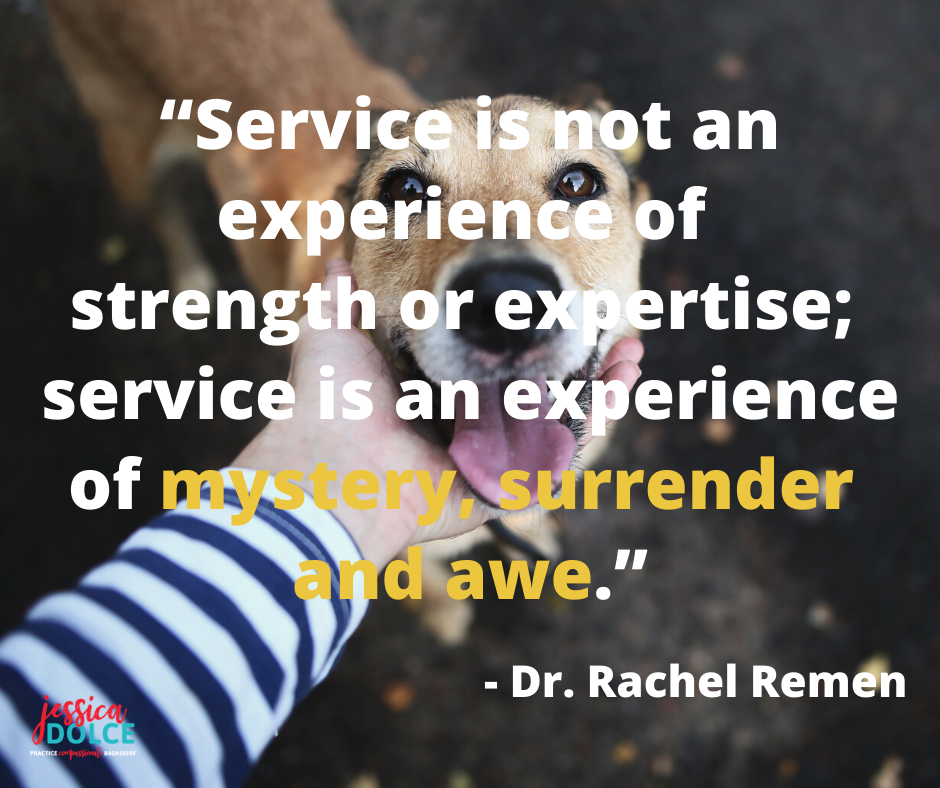The #1 Thing Your Boss Doesn’t Want Me to Talk About

When I’m facilitating workshops and webinars, organizations typically ask me to focus on teaching their staff self-care.
No surprises there. Learning about self-care is really important.
But, as you’ve heard me say before, it’s only one part of the wellbeing puzzle.
The other half is organizational policies and practices, like workload, training and supervision, and equitable pay (because landlords don’t accept “I do yoga everyday!” as rent payment…yet).
Still, I’m happy to talk about self-care, because it’s what individuals have the most control over and it really does help.
But here’s where it gets interesting:
I’ve repeatedly been asked to leave out one specific element of self-care from my workshops.
What do you think it is?
I’ll wait while you guess.
No, it’s not financial self-care.
Nope, it’s not sexual self-care.
It’s…

Spiritual self-care.
Lots of organizations do not want me to talk about spirituality with their staff.
Which is a problem, because spirituality is a big part of what keeps us well while doing challenging work.
I get why this topic feels taboo in our workplaces.
I think it’s mostly because we confuse spirituality with organized religion.
Religion and spirituality are not the same thing.
Religion: is an institutionalized system of religious attitudes, beliefs, and practices; the service and worship of God or the supernatural.
Spirituality: connotes an experience of connection to something larger than you; living everyday life in a reverent and sacred manner.
Or as Christina Puchalski, MD (leader in trying to incorporate spirituality into healthcare), puts it,
“Spirituality is the aspect of humanity that refers to the way individuals seek and express meaning and purpose and the way they experience their connectedness to the moment, to self, to others, to nature, and to the significant or sacred.”
You probably knew that already, but I didn’t understand the difference between the two until I was old enough to have a periodontist.
And it blew my non-religious mind.
That’s when I understood that the aspect of my wellness wheel that was 99% missing were spiritual beliefs and intentional practices that would ground, connect, and sustain me.
Since no one talks about the role of spirituality in our professional lives, I just figured it was like a bonus round of self-care you do if and when you had some extra time (like using a Waterpik when you’re already flossing and brushing).
Today I understand that regular spiritual care is fundamental to our wellbeing.
Spirituality can help us navigate through difficult choices about euthanasia and painful end-of-life experiences.
It can help us accept our fundamental limits as human beings, while also allowing us to feel connected to something much bigger than ourselves.
Spirituality can anchor our daily actions in our values and ethics, helping us to stay present with the suffering we witness and motivated to do difficult work.
And it helps us tap into joy, purpose, and satisfaction. Career-sustaining stuff.
So we’re doing ourselves and our staff a disservice if we don’t allow any acknowledgement of this important part of our individual and collective wellbeing.

Still not sure spirituality has a place in our professional self-care?
In her research, Brené Brown found that across the board, the most resilient people have a spiritual life.
She shares, “Without exception the concept of spirituality emerged from the data as a critical component of resilience and overcoming struggle.”
If we want resilience for ourselves and our staff, then it’s time to welcome spirituality into our conversations about self-care.
Because if there’s anything less effective than self-care, it’s censored self-care.
So if organizations want to keep the focus solely on self-care, instead of organizational care, they need to embrace ALL aspects of human wellbeing.
So what does spirituality look like at work? At home?
How does it help us care for ourselves, so we can keep giving to animals?
It starts by getting curious about what nurtures your spirit. Not mine. Yours.
What brings you joy? Creates a sense of awe? Connects you to meaning and purpose?
It may be organized religion for you or it could be something totally different, like sunsets or quantum physics.
Whatever it is, how can you get more of that into your life on a regular basis?
And if you want to see spirituality in action at work, check out the Netflix show Lenox Hill.
Watch the staff engage in their pre-surgery ritual: a pause to connect with themselves, each other, the human-ness of each patient, and to quietly center themselves in whatever way works for them (it might be religious prayer, secular mantras, or just a deep breath).
What would that look like in your workplace?
Let's Stay Connected.
Sign up for ideas, updates, and your free copy of The ABCs of Self Care Workbook!
I heart boundaries and will never sell your email address. Unsubscribe at any time.

